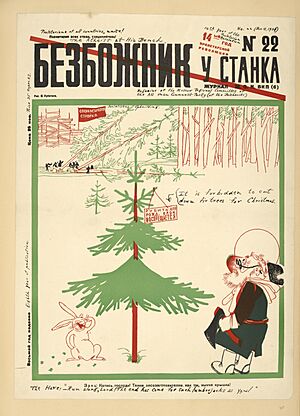Christmastide facts for kids
Christmastide is a special time in the Christian church calendar. It's often called the Twelve Days of Christmas.
For many Christian churches, like the Catholic Church, Lutheran Church, Anglican Church, and Methodist Church, Christmastide starts on Christmas Eve (December 24) at sunset. This is the start of the Christmas season. Before this, Christians observe Advent, which is a time of waiting and preparing for Christmas. Christmastide usually ends on January 5, which is known as Twelfth Night. After this, some churches celebrate a related season called Epiphanytide.
Many important celebrations happen during Christmastide. These include Christmas Day (December 25), St. Stephen's Day (December 26), Childermas (December 28), New Year's Eve (December 31), and New Year's Day (January 1), which is also celebrated as the Solemnity of Mary, Mother of God or the Feast of the Circumcision of Christ. The season ends with Twelfth Night on the evening of January 5.
During this festive time, people enjoy many traditions. These include singing carols, giving gifts, watching Nativity plays, going to church services, and eating special foods like Christmas cake. Common Christmas greetings are "Merry Christmas and a Happy New Year!" in Western Christian countries, and "Christ is born!" with the response "Glorify Him!" in Eastern Christian traditions.
Contents
When is Christmastide?

Christmastide is often called the Twelve Days of Christmas. It traditionally lasts for 12 days, from December 25 to January 5. The last day is known as Twelfth Night. Many churches, like the Lutheran Church and the Anglican Church, follow these dates.
However, some Christian groups define the end of Christmastide differently. For example, the Roman Rite of the Catholic Church expanded Christmastide in 1969. It now runs "up to and including the Sunday after Epiphany or after January 6." This means the season can be a bit longer for Catholics.
History of the Christmas Season
Long ago, in 567 AD, a church meeting called the Council of Tours made the twelve days from Christmas to Epiphany a special, festive time. They also said that people should fast (eat less or special foods) during Advent to prepare for Christmas. This helped the Roman Empire organize its calendars.
In the Middle Ages, Christmastide often lasted even longer. It went from Christmas Day all the way to February 2, which is the Feast of the Presentation of Jesus in the Temple. This day is also called Candlemas. It's named Candlemas because candles are blessed on this day, inspired by the Song of Simeon in the Bible, which talks about Jesus being "a light for revelation to the nations." Many churches call the period after the traditional Twelve Days and up to Candlemas, Epiphanytide.
Christmas Traditions

During the Christmas season, people enjoy many festivities. Homes and churches are decorated with Christmas decorations. These decorations are often put up during Advent. Popular decorations include the Nativity Scene, the Christmas tree, and various Christmas ornaments.
In Western Christian countries, Christmas decorations are usually taken down on Twelfth Night (January 5) or Candlemas (February 2). It's considered bad luck to leave them up after Candlemas. A book from 1945, The Saint Andrew Daily Missal, suggests:
Every Christian home should have its own little crib round which, on these days, morning and evening prayers should be said. At this season, consecrated to childlike joys, children will understand that they must join with the shepherds and the wise men together with Mary and Joseph in worshipping the Child Jesus, the Babe who lying on His bed of straw is God and beseech Him that through His grace they may become ever increasingly children of God together with Him. The greetings of "Happy Christmas" which remind us of the artless mirth of the shepherds on that holy night; the Christmas tree, often with a source of joy to the poor, representatives of Christ in the property of His manger bed; Christmas gifts recalling God's great gift of His Son to us on the first Christmas night; the Twelfth-Night cake; all these are Christian customs which ought to be preserved. —The Saint Andrew Daily Missal
On Christmas Eve or Christmas Day, many families go to a service of worship or Mass at church. During Christmastide, some Christian families give gifts on each of the Twelve Days of Christmas. Others give gifts only on Christmas Eve, Christmas Day, or Twelfth Night. The tradition of giving gifts during Christmastide reminds Christians of the gifts the Three Wise Men brought to the baby Jesus.
Many families have a big feast on Christmas Day. Before eating, they often say grace. Special desserts like Christmas cake are popular. In India, a type of Christmas cake called Allahabadi cake is well-known.
Singing Christmas carols is also very common. People sing them in churches and sometimes go from house to house. Famous carols include "Silent Night", "We Three Kings", and "God Rest Ye Merry, Gentlemen". During the Christmas season, TV channels often show movies about Christmas or Christianity, like The Greatest Story Ever Told.

On Saint Stephen's Day (December 26), some people traditionally have their horses blessed. On the Feast of Saint John the Evangelist (December 27), wine is blessed and enjoyed. On New Year's Eve (December 31), many Christians go to a watchnight service. They thank God for the past year and promise to serve Him in the new year. Throughout the twelve days, many people also enjoy Nativity plays and other musical shows.
In the Eastern Orthodox Church in Russia, Christmastide is called "Svyatki," meaning "Holy Days." It runs from January 7 (Christmas Day for them) to January 19 (Theophany, or Baptism of Christ). During this time, people go to church, sing carols, visit friends and family, and help others. They might visit the sick, elderly, or orphans, and give to charity.
Christmas Celebrations in History
Throughout history, some governments have tried to stop Christmas celebrations.
Revolutionary France
During the French Revolution, some leaders wanted to remove religion from public life. They banned Christian religious services for Christmas. Even the "three kings cake," a traditional Christmas treat, was renamed the "equality cake."
Soviet Union
After the Soviet Union was formed in 1917, the government promoted state atheism, meaning they didn't believe in religion. Christmas celebrations and other Christian holidays were forbidden. Instead of Saint Nicholas, people had "Grandfather Frost" who brought gifts on New Year's Day, helped by a snowmaiden.
It wasn't until 1991, when the Soviet Union broke apart, that Christmas could be openly celebrated again in Russia. The Orthodox Church Christmas is on January 7, and it is now a national holiday.
Nazi Germany
In Nazi Germany, leaders saw organized religion as a threat to their power. They tried to remove the Christian parts of Christmas. They promoted Nazi Christmas songs that focused on their own ideas instead of Christian themes.
People's Republic of China
The government of the People's Republic of China also promotes state atheism. In December 2018, officials closed Christian churches just before Christmas. Christmas trees and Santa Clauses were also removed. Today, Christmas in modern China is mostly a commercial day and not a public holiday.
See also
 In Spanish: Tiempo de Navidad para niños
In Spanish: Tiempo de Navidad para niños


